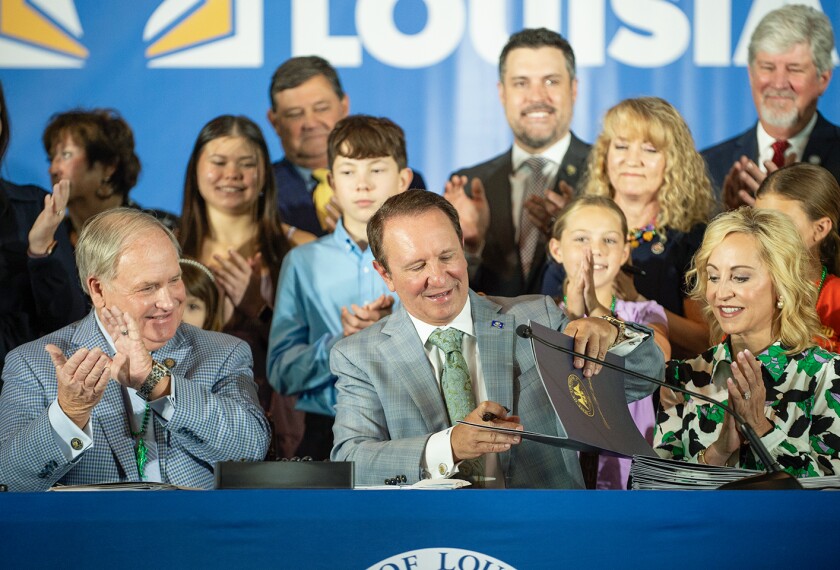The Bush administration has urged the U.S. Supreme Court to strike down school assignment plans that use race to help determine which students may enroll in specific public schools.
The administration argues in legal briefs filed in two potentially landmark cases that the voluntary use of race to foster diversity in student populations violates the 14th Amendment’s guarantee of equal protection of the law.
“School districts have an unquestioned interest in reducing minority isolation through race-neutral means. But the solution to addressing racial imbalance in communities or student bodies is not to adopt race-conscious measures,” says the brief filed by U.S. Solicitor General Paul D. Clement in a case involving the Seattle school district’s race-conscious plan.
The Seattle case, along with one from Jefferson County, Ky., will be argued in the Supreme Court term that begins Oct. 3.
Like many urban school systems, the 97,000-student Jefferson County district, which includes the city of Louisville, formerly was under a court-supervised school desegregation plan. The district adopted a voluntary plan in 2001 after a federal court declared it “unitary” and free of the vestiges of past racial discrimination.
Jefferson County’s “managed choice” plan includes consideration of race for some student assignments. The plan seeks to have a black enrollment of at least 15 percent and no more than 50 percent at each school.
The 46,000-student Seattle district was never under court-ordered desegregation, but adopted its assignment plan in 2000 that uses race as a way to foster educational and social benefits in its classrooms. The plan uses race as one of several tie-breakers for its 10 high schools when a school is oversubscribed after 9th graders select their preferred school.
In both Jefferson County and Seattle, parents of white students challenged the race-conscious plans.
In earlier stages of litigation, the U.S. Court of Appeals for the 6th Circuit, in Cincinnati, upheld the Jefferson County district’s plan, while the U.S. Court of Appeals for the 9th Circuit, in San Francisco, upheld the Seattle district’s plan, although that plan has been suspended pending the outcome of the case.
The high court accepted both cases—Parents Involved in Community Schools v. Seattle School District No. 1 (Case No. 05-908) and Meredith v. Jefferson County Board of Education (No. 05-915)—for review last spring and will consider them together, although arguments in the case have not yet been scheduled. (“High Court to Consider Use of Race,” June 14, 2006.)
Parallel Arguments
In its “friend-of-the-court” briefs filed Aug. 21, the Bush administration uses nearly identical arguments to contend that neither of the plans are “narrowly tailored,” nor further “a compelling government interest.” Those are requirements for constitutionality that the high court has established for all government classifications based on race.
The briefs say the plans are indistinguishable from a racial quota, and the districts failed seriously to consider any of the various race-neutral alternatives to eliminate or reduce minority isolation. They also contend that the plans unfairly burden innocent third parties, and they have no fixed or logical end point.
Both plans are “devoid of the type of holistic, individualized consideration” that the court found critical for upholding race-conscious admissions in its landmark 2003 decisions involving the University of Michigan.
The solicitor general’s briefs, which were also signed by Kent D. Talbert, the general counsel of the U.S. Department of Education, met immediate criticism from legal experts at several education organizations.
“My immediate reaction is the federal government has its head buried in the sand,” said Francisco M. Negrón Jr., the general counsel of the National School Boards Association, in Alexandria, Va. He criticized the administration for focusing on de jure segregation and the goal of overcoming the vestiges of past legal discrimination.
“What about de facto segregation?” he said. The administration’s position is “not a view that understands the realities faced by modern school districts.”
The federal position, he added, recognizes the existence of racial isolation and the ability of school districts to address it, “but then they say you can’t use race in consideration of the racial isolation issue.”
That places school districts in a quandary by removing “the single greatest tool that’s available to school districts in addressing racial isolation,” which is the examination of racial isolation in their schools, Mr. Negrón said.
He added that the government’s brief similarly recognizes that school districts have an interest in promoting diversity as a pedagogical goal—but will only allow school districts to address that goal through race-neutral means, without explaining how that is to be done effectively.
The NSBA plans to file friend-of-the-court briefs in support of the school districts.
The Seattle and Jefferson County districts, and their allies, have until Oct. 10 to file their briefs in the cases.




